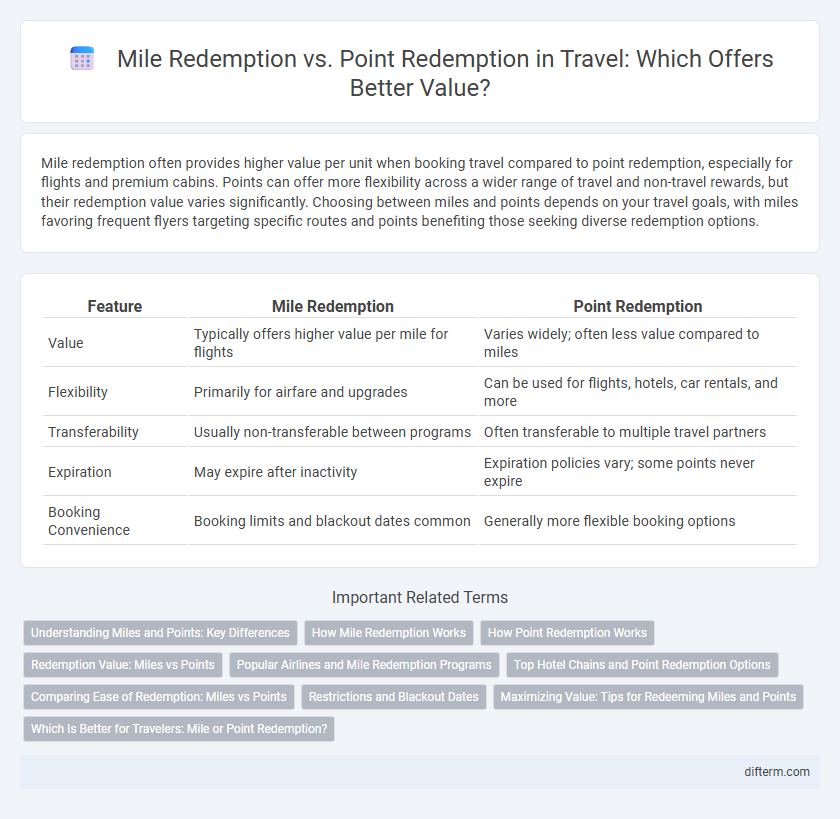Mile redemption often provides higher value per unit when booking travel compared to point redemption, especially for flights and premium cabins. Points can offer more flexibility across a wider range of travel and non-travel rewards, but their redemption value varies significantly. Choosing between miles and points depends on your travel goals, with miles favoring frequent flyers targeting specific routes and points benefiting those seeking diverse redemption options.
Table of Comparison
| Feature | Mile Redemption | Point Redemption |
|---|---|---|
| Value | Typically offers higher value per mile for flights | Varies widely; often less value compared to miles |
| Flexibility | Primarily for airfare and upgrades | Can be used for flights, hotels, car rentals, and more |
| Transferability | Usually non-transferable between programs | Often transferable to multiple travel partners |
| Expiration | May expire after inactivity | Expiration policies vary; some points never expire |
| Booking Convenience | Booking limits and blackout dates common | Generally more flexible booking options |
Understanding Miles and Points: Key Differences
Miles and points are two common loyalty currency types used in travel rewards programs, each with distinct redemption values and uses. Miles typically represent a distance-based value redeemable mainly for flights, offering variable worth depending on the airline and route, while points often provide broader redemption options including hotels, car rentals, and retail purchases with more consistent value. Understanding the specific program's valuation metrics for miles versus points is essential for maximizing travel benefits and optimizing reward redemptions.
How Mile Redemption Works
Mile redemption allows frequent flyers to exchange accumulated airline miles for free or discounted flights, upgrades, and other travel-related perks, making it a valuable feature of loyalty programs. Each mile corresponds to a specific value set by the airline, influencing how many miles are required for various ticket classes and destinations. Redemption typically involves booking through the airline's loyalty portal, where availability depends on factors like flight demand and blackout dates.
How Point Redemption Works
Point redemption allows travelers to exchange accumulated loyalty points for various travel rewards such as flights, hotel stays, car rentals, or upgrades. Unlike mile redemption, which typically applies only to airline tickets, point redemption offers more flexibility across multiple travel partners and services within a loyalty program's network. The value of points can vary depending on the redemption option and timing, requiring strategic planning to maximize travel benefits.
Redemption Value: Miles vs Points
Mile redemption generally offers higher value per unit compared to point redemption, often translating to better flight deals and upgrades. Points can vary widely in value depending on the program, but miles typically maintain a consistent redemption ratio, maximizing travel rewards. Choosing miles over points often results in more efficient use of travel rewards for flights and premium services.
Popular Airlines and Mile Redemption Programs
Popular airlines like Delta Air Lines and United Airlines offer competitive mile redemption programs that provide valuable rewards for frequent travelers. Mile redemption typically offers higher value towards flights, upgrades, and partner airlines compared to point redemption systems used by programs such as American Express Membership Rewards and Chase Ultimate Rewards. Understanding the specific airline's loyalty program structure can maximize travel benefits through strategic mile or point usage.
Top Hotel Chains and Point Redemption Options
Top hotel chains such as Marriott Bonvoy, Hilton Honors, and World of Hyatt offer versatile point redemption options, allowing travelers to maximize value when booking stays or experiences. Mile redemption often applies primarily to airline loyalty programs, whereas point redemption through hotel programs provides flexibility including free nights, upgrades, and exclusive experiences. These top hotel chains frequently feature seasonal promotions and partnerships that enhance point redemption potential, delivering greater rewards compared to standard mile redemptions.
Comparing Ease of Redemption: Miles vs Points
Miles often offer easier redemption options for flights due to airline loyalty programs featuring straightforward award charts and fewer blackout dates. Points redemption can be more complex as they are commonly part of broader reward systems involving multiple partners, requiring additional steps to transfer or convert points before booking travel. Generally, miles provide more direct and intuitive travel redemptions, enhancing user convenience and maximizing value.
Restrictions and Blackout Dates
Mile redemption often faces more restrictions and blackout dates compared to point redemption, limiting flight availability during peak travel seasons and holidays. Point redemption programs generally offer greater flexibility with fewer blackout periods, allowing travelers to use their rewards on a wider range of options including flights, hotels, and car rentals. Understanding specific airline or loyalty program policies on blackout dates and booking windows is crucial for maximizing the value of miles or points.
Maximizing Value: Tips for Redeeming Miles and Points
Maximizing value when redeeming miles and points requires comparing the redemption rates between airline miles and credit card points to identify the best conversion options. Prioritize award flights, especially in premium cabins, as they often offer a higher value per mile compared to merchandise or cash redemptions. Utilizing transfer partners and booking during promotional periods can significantly increase the worth of your rewards.
Which Is Better for Travelers: Mile or Point Redemption?
Mile redemption generally offers higher value for travelers booking flights, especially with international or premium cabin tickets, as airline miles are directly tied to flight rewards and often have fewer blackout dates. Point redemption, however, provides greater flexibility, allowing travelers to use points for hotels, car rentals, or experiences, making it ideal for those seeking diverse travel options. Choosing between miles and points depends on the traveler's priorities: maximizing flight rewards or enjoying versatile travel benefits.
Mile redemption vs Point redemption Infographic

 difterm.com
difterm.com